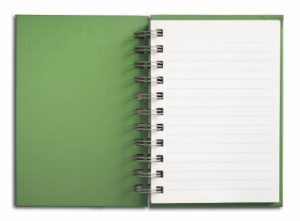Why You Should Keep A Diary Of Eating Behaviors
 The idea of keeping a “food journal” is nothing new – dieters have been using this tactic for years, as research suggests it can help with making better food choices and long-term weight management.
The idea of keeping a “food journal” is nothing new – dieters have been using this tactic for years, as research suggests it can help with making better food choices and long-term weight management.
For individuals with eating disorders, however, keeping a food diary to track eating behaviors can be helpful for other reasons.
Here are a few:
It can help you identify patterns.
The rabbit hole of disordered eating habits can be a dark and confusing one. It’s often hard to see clearly enough to recognize what’s actually happening.
Keeping a diary of your behaviors can help you spot patterns you have around food – the things you do perhaps unknowingly that could be sabotaging your efforts to maintain healthy behaviors.
It can help you manage triggers.
When you start to see patterns in your eating behaviors, you’ll also start to notice what situations, circumstances, feelings, thoughts, or actions tend to come before disordered eating episodes or behaviors. Spotting these triggers is the first step in actually being able to manage them.
Once you’re fully aware of what those stressors are, you can begin working on ways to cope with them.
It can aid weight loss.
If you suffer from behaviors that cause you to gain weight, like binge eating disorder, then keeping a food diary can be helpful in this area. Many studies have found a link between written food and behavior tracking and the ability to maintain weight loss.
It can give you perspective.
Tracking your eating behaviors can also give you long-term perspective as you navigate these issues over the years. Additionally, if you’re working with a counselor or therapist, a journal can provide a basis for outside perspective as well – provided you’re willing to share the information with that person.
Over time, a food diary can reveal areas of growth, as well as highlight what you may still need to work on.
Source:
Web MD
Image courtesy of nuttakit/FreeDigitalPhotos.net
 Eating Disorder Self Test. Take the EAT-26 self test to see if you might have eating disorder symptoms that might require professional evaluation. All answers are confidential.
Eating Disorder Self Test. Take the EAT-26 self test to see if you might have eating disorder symptoms that might require professional evaluation. All answers are confidential.